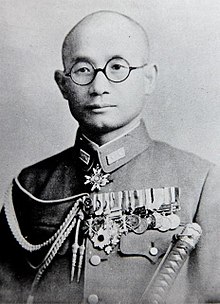Masanobu Tsuji
| Masanobu Tsuji | |
|---|---|
 |
|
| Nickname(s) | The God of Operations |
| Born | October 11, 1901 Ishikawa Prefecture, Japan |
| Died |
Declared dead 20 July 1968 (age 60-67) Unknown |
| Allegiance | Empire of Japan |
| Service/branch |
|
| Years of service | 1924–1945 |
| Rank | Rikugun Taisa (Colonel) |
| Battles/wars | World War II (Pacific War) |
Masanobu Tsuji (辻 政信 Tsuji Masanobu?, 11 October 1901 – ca.1961) was a Japanese army officer and politician. During World War II, he was an important tactical planner in the Imperial Japanese Army; he developed the detailed plans for the successful Japanese invasion of Malaya at the start of the war. He also helped plan and lead the final Japanese offensive during the Guadalcanal Campaign.
Tsuji was deeply involved in Japanese atrocities throughout the war. He evaded prosecution for war crimes at the end of the war, living in hiding in Thailand. He returned to Japan in 1949 and was elected to the Diet as an advocate of renewed militarism. In 1961, he disappeared on a trip to Laos.
Tsuji was among the most aggressive and influential Japanese militarists. He was a leading proponent of the concept of gekokujō, "leading from below" or "loyal insubordination" by acting without or contrary to authorization. He incited the 1939 border clash with the USSR, and was a vehement advocate of war with the United States.
Masunobu Tsuji was born in the Ishikawa Prefecture in Japan. He received his secondary education at a military academy and then graduated from the War College.
By 1934, he was active in the Army's political intrigues as a member of the Tōseiha ("Control Faction"), and helped block the attempted coup d'état of the rival Kōdōha ("Imperial Way Faction"). This brought him the patronage of general and future Prime Minister Hideki Tojo and general and future War Minister Seishirō Itagaki.
...
Wikipedia
